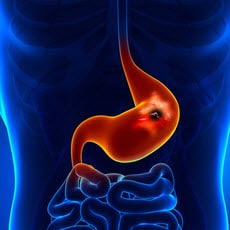
Duodenal Ulcer

Summary
A peptic ulcer is a sore in the lining of your stomach or your duodenum, the first part of your small intestine. A burning stomach pain is the most common symptom. The pain:
- Starts between meals or during the night
- Briefly stops if you eat or take antacids
- Lasts for minutes to hours
- Comes and goes for several days or weeks
Peptic ulcers happen when the acids that help you digest food damage the walls of the stomach or duodenum. The most common cause is infection with a bacterium called Helicobacter pylori. Another cause is the long-term use of nonsteroidal anti-inflammatory medicines (NSAIDs) such as aspirin and ibuprofen. Stress and spicy foods do not cause ulcers, but can make them worse.
To see if you have an H. pylori infection, your doctor will test your blood, breath, or stool. Your doctor also may look inside your stomach and duodenum by doing an endoscopy or x-ray.
Peptic ulcers will get worse if not treated. Treatment may include medicines to reduce stomach acids or antibiotics to kill H. pylori. Antacids and milk can’t heal peptic ulcers. Not smoking and avoiding alcohol can help. You may need surgery if your ulcers don’t heal.
NIH: National Institute of Diabetes and Digestive and Kidney Diseases
Source: MedlinePlus, National Library of Medicine.
Information pulled from the Peptic Ulcer page.
MedlinePlus brings together authoritative health information from the National Library of Medicine (NLM), the National Institutes of Health (NIH), and other government agencies and health-related organizations.
Definition & Facts for Peptic Ulcers (Stomach or Duodenal Ulcers)
National Institute of Diabetes and Digestive and Kidney Diseases
Peptic Ulcer Disease
American Academy of Family Physicians
Peptic Ulcer Disease
American College of Gastroenterology
Ulcers
American Academy of Family Physicians
Barium Swallow
National Library of Medicine
Diagnosis of Peptic Ulcers (Stomach or Duodenal Ulcers)
National Institute of Diabetes and Digestive and Kidney Diseases
Fecal Occult Blood Test (FOBT)
National Library of Medicine
Helicobacter Pylori (H. Pylori) Tests
National Library of Medicine
Upper GI Endoscopy
National Institute of Diabetes and Digestive and Kidney Diseases
Upper GI Series
National Institute of Diabetes and Digestive and Kidney Diseases
Treatment for Peptic Ulcers (Stomach Ulcers)
National Institute of Diabetes and Digestive and Kidney Diseases
Listen to our
latest Podcast!


